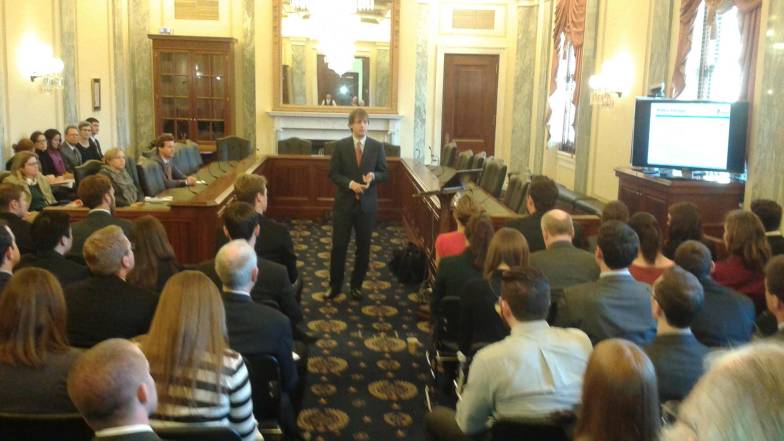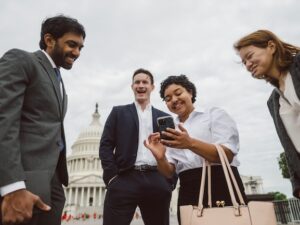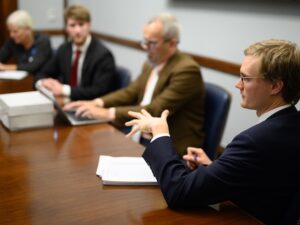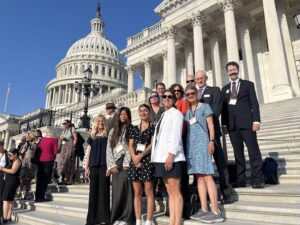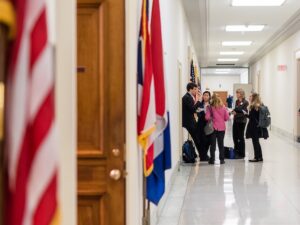Packed rooms in Senate and House hear about REMI Carbon Fee and Dividend study
By Steve Valk
As Roy Scheider said after his first close encounter with “Jaws,” “We’re gonna need a bigger boat.”
At 10 a.m. on Wednesday morning, when the briefing for the REMI study on CCL’s fee-and-dividend proposal was supposed to start, a line of Senate staffers was stretched out the door. With a smile, I turned to CCL Membership Coordinator Susan Higgins and said, “We’re gonna need a bigger room.”
It ended up being a standing-room-only crowd as we crammed 70 staffers into a subcommittee hearing room meant to hold 50.
Why had we packed the room to overflowing?
The simple answer is that CCL volunteers, our constituent lobbyists, called Senate and House offices last month asking for someone to attend the briefing. It was clear to me that without those calls and emails, most of the chairs in that room would have been empty.
Since its release in June, the REMI study has been a game-changer in conversations with congressional offices, especially Republicans. The study found that CCL’s proposal – a carbon fee rising $10 per ton of CO2 each year with revenue returned equally to all households – will cut CO2 emissions in half within 20 years while adding 2.8 million jobs to the economy.
Our thinking was pretty simple: As more and more people on Capitol Hill learn about the study and its findings, we’ll get closer to getting a bipartisan bill introduced. I call it the Three R strategy – Ride REMI to the Rose Garden.
With the wheels in motion for a targeted lobbying day, it made sense to follow up with briefings for Senate and House staff. With the help of Sen. Maria Cantwell (D-WA) and Rep. John Larson (D-CT), we were able to get rooms where Scott Nystrom, author of the REMI study, led briefings to standing-room-only crowds in both the Senate and House.
It helped immensely that CCL staff and volunteers visited more than 100 offices on the Hill Tuesday, making one final push to bring staff to the briefings.
The House briefing on Thursday was as packed to capacity as the Senate briefing, and at a certain point we had to stop letting people in and start a list of aides who would be interested in a future briefing.
“This was huge, the briefings exceeded all reasonable expectations,” said Danny Richter, CCL’s Legislative Director. “Packing the room both times showed staffers that there is widespread interest in our proposal. Planning the lobby day right after the election was risky. The reward, though, is that ours is the last voice they hear before the end of the session, just as they’re setting the agenda for next year.”
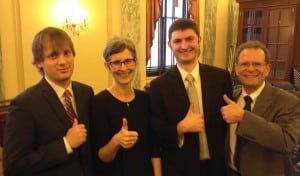
From left, Scott Nystrom, Jessica Langerman, Danny Richter and Peter Fiekowsky are all smiles after the Senate REMI briefing.
For Peter Fiekowsky and Jessica Langerman, two CCL’s volunteers who played big roles in the REMI study, the capacity turnout at the Senate briefing was a euphoric moment.
Fiekowsky, after seeing the results of a REMI study he’d commissioned about the impact of a statewide carbon tax in California, provided funding for the nationwide study released in June. As you can see in the photo, he was all smiles following Wednesday’s briefing.
The national REMI study and this week’s briefings might not have happened, however, without the effort and support of Jessica Langerman, a CCL volunteer from Massachusetts.
“This is the proudest moment of my life as an environmental activist.” said Langerman, following the Senate briefing.
While sitting at a kitchen table with Boston CCL leader Gary Rucinski in 2011, the two hatched a plan to start a campaign for a statewide carbon tax in Massachusetts. For such a movement to be taken seriously, though, a study needed to be done on the impact of a revenue-neutral carbon tax.
In stepped Cathy Carruthers, a retired energy economist from Washington state, who recommended REMI for the study and provided the lion’s share of the funding for it. Langerman and her husband plunked down an additional $10,000 to commission REMI to explore a Massachusetts carbon tax. They also paid expenses to bring REMI author Scott Nystrom to a briefing at the State House.
Because of the study Langerman, her husband and Carruthers commissioned, the state hired REMI for a more comprehensive study. A coalition for a statewide carbon tax in Massachusetts sprouted up, led by an organization called Climate XChange.
The success of the Massachusetts study motivated Fiekowsky to pursue a California study and then the national study, and we’ve been turning heads ever since.
Between the lobby day and the briefings this week, the groundwork is being laid for legislation in the next Congress.
Steve Valk is Communications Director for Citizens Climate Lobby.

